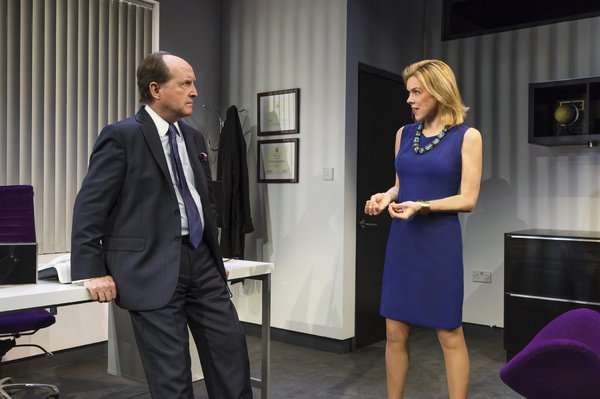
Linda (Janie Dee) faces down older daughter Alice (Jennifer Ikeda) as younger daughter Bridget (Molly Ranson) looks on in LINDA (photo by Richard Termine)
Manhattan Theatre Club
New York City Center Stage 1
Tuesday – Sunday through April 2, $79-$90
212-581-1212
www.lindaplay.com
www.nycitycenter.org
I’m writing this on International Women’s Day, when women around the world came together “to help forge a better working world — a more gender inclusive world,” which is particularly relevant to Penelope Skinner’s Linda, making its New York debut at City Center Stage I through April 2. Two-time Olivier Award winner Janie Dee gives a breathless, whirlwind performance as the title character in an otherwise lackluster, kitchen-sink production from Manhattan Theatre Club. It appears that Linda, a fifty-five-year-old marketing executive at Swan with a devoted husband and two daughters, has it all. The play opens with her making an impressive multimedia pitch for a new campaign for an anti-ageing cream, aiming it at older women who are often overlooked by the beauty market, unless they’re Helen Mirren. “Let’s make these invisible women feel seen again,” she says. “Let’s say to them: ‘Ladies? We know you’re out there! We see you! You exist!’” However, the head of the company, Dave (John C. Vennema), decides instead to go with a campaign aimed at social-media-savvy millennials presented by Amy (Molly Griggs), an ambitious and aggressive twenty-five-year-old who has her eyes set on Linda’s office and job. Meanwhile, temp Luke (Maurice Jones) finds Linda quite attractive. Back at home, Linda’s daughter from her first marriage, Alice (Jennifer Ikeda), spends most of her time in her room, wearing a skunk costume to try to make herself invisible to others because of a cyber-shaming incident that occurred ten years before, when she was fifteen. Linda’s other daughter, fifteen-year-old Bridget (Molly Ranson), from her second marriage to Neil (Donald Sage Mackay), is agonizing over which monologue to deliver at an audition to get into a prestigious acting academy. Her parents want her to do Ophelia, but Bridget is more interested in a stronger role, perhaps Macbeth or Lear, instead of the suffering, victimized female character. And Neil is in a new band with inexperienced young singer Stevie (Meghann Fahy). “I’m an award-winning businesswoman. I’m happily married with two beautiful daughters and I still fit in the same size ten dress suit I did fifteen years ago,” Linda proudly says several times, but her carefully constructed world is about to come tumbling down. “I will not disappear!” she declares, even as she is becoming a footnote in her own life.

Linda (Janie Dee) encounters unexpected problems at the office with company founder Dave (John C. Vennema) (photo by Richard Termine)
Titling the play after the protagonist’s first name places the character front and center, as if she’s on her own, battling stereotypes all by herself. She’s threatened not only by men but by women who want what she has and knowingly or unknowingly undermine her to taste at least a little bit of her power. Dee (Carousel, Comic Potential) is exceptional as Linda, a role originated in London by Noma Dumezweni after Kim Cattrall had to drop out for health reasons. She looks sexy and glamorous in Jennifer von Mayrhauser’s sharp, boldly colored outfits, but she stands out too much, overwhelming the other characters, who are more like caricatures. Walt Spangler’s revolving set drags down the narrative, as does Fitz Patton’s uninspired music. MTC artistic director Lynne Meadow can’t find a natural pace to the proceedings, which stagger from scene to scene. Skinner (The Village Bike, The Ruins of Civilization) packs Linda with far too many subplots, taking on too many women’s issues in a mere two hours. Each one is important in its own way, but they get lost in the shuffle. “I used to be the protagonist of my life and now suddenly I’m starting to feel irrelevant,” Linda admits; that statement also relates to the play itself, especially in the shadow of the International Women’s Day marches also known as “A Day without a Woman.”